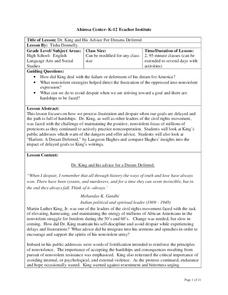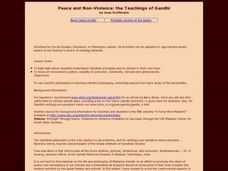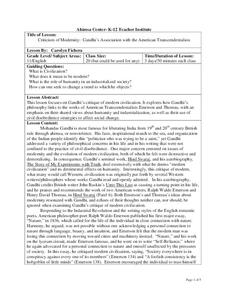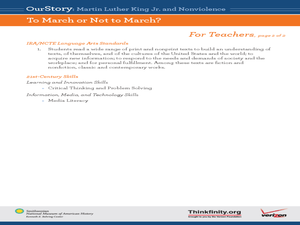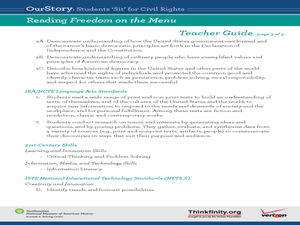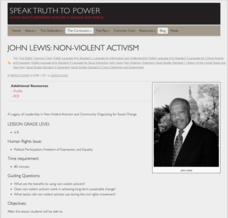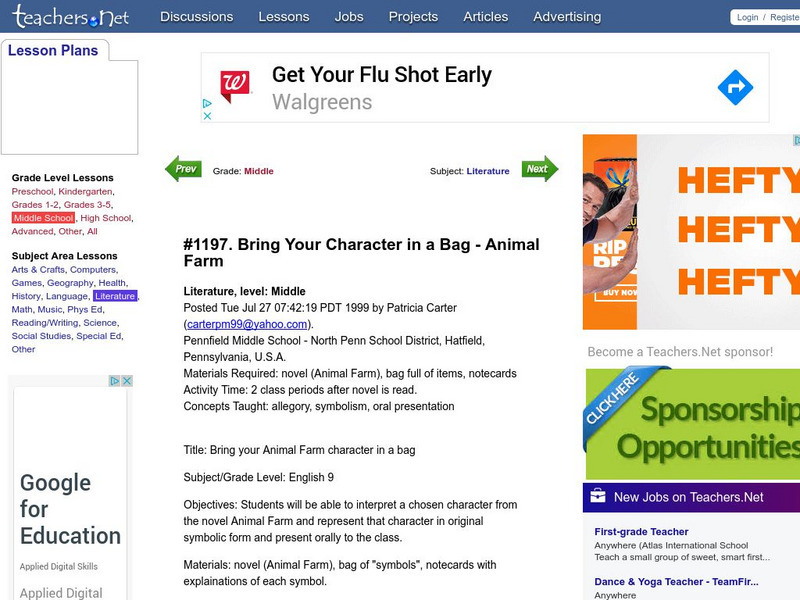Curated OER
Dr. King and His Advice for Dreams Deferred
Students analyze Dr. King's public addresses and Langston Hughes' poetry as a study of the Civil Rights' nonviolent approach to making an impact. In this protesting lesson, students read poetry of Hughes and speeches by Dr. King as a...
Curated OER
Applying Ahimsa to Traditional Stories
Investigate the life of Mahatma Gandhi by researching non-violent lifestyles. Learners define the word ahimsa and discuss the personal characteristics that made Gandhi a peaceful warrior. They also create a poster about the story "The...
Curated OER
Peace and Non-Violence: the Teachings of Gandhi
Learners study the Gandhian philosophy. They define certain elements such as power, beauty and discuss what they know about the struggle for independence in India. Finally students collaborate to discuss Gandhian principles to extend...
Curated OER
Designing a Civilization for an Art Room
Students discover the ideas of civilizations by researching Gandhi's philosophies. In this art decoration lesson, students investigate Gandhi's opinions on civilizations, community and ethics. Students collaborate by decorating an art...
Curated OER
Tracing the Idea of Civil Disobedience through Thoreau, Gandhi, and King
Students analyze civil disobedience through history studying Thoreau, Gandhi, and Dr. King. In this civil disobedience lesson, students read and analyze excerpts from Thoreau, Gandhi, and Martin Luther King. Students demonstrate their...
Curated OER
Criticism of Modernity: Gandhi's Association with the American Transcendentalists
Eleventh graders explore Gandhi's philosophy links to the works of American Transcendentalists Emerson and Thoreau. In this transcendentalism instructional activity, 11th graders discuss essential questions about civilization and modernity.
Curated OER
RBG Dr. Martin Luther Jr. Studies Lesson Plan-Guide
Explore Martin Luther King Jr. Students listen to a speech given by Martin Luther King, and interpret his message. They discuss civil rights and how Martin Luther King Jr. exhibited good citizenship, then brainstorm ways in which they...
Curated OER
Martin Luther King, Jr. Day Crossword
In this Martin Luther King worksheet, students read 10 clues pertaining to the civil rights leader. Students fit their answers from the word bank into a crossword puzzle.
Curated OER
Martin Luther King, Jr. Day Vocabulary
In this Martin Luther King worksheet, students analyze 10 words that pertain to Martin Luther King. Students match the words with their meanings.
Curated OER
Martin Luther King, Jr. Day Word Search
In this Martin Luther King worksheet, students read 10 words that pertain to the civil rights leader, Dr. Martin Luther King, Jr. Students circle the words in a word search puzzle.
Curated OER
Martin Luther King, Jr.
In this Martin Luther King learning exercise, students read a passage about King. They then answer six multiple choice recall questions about the story.
Education World
Every Day Edit - Gandhi
In this everyday editing worksheet, students correct mistakes in a short paragraph about Gandhi. The errors range from punctuation, capitalization, grammar, and spelling.
Curated OER
To March or Not to March?
Students read historical artifacts about the March on Washington for Jobs and Freedom and analyze the choices made during the time. In this March on Washington lesson, students read Martin's Big Words and the 'Step Back in Time' sheets....
Curated OER
Aahimsa in the Real World: Identifying Ahimsa
Second graders become familiar with the use of the newspaper and how it educates people. In this ahimsa lesson, 2nd graders recognize the importance of Gandhi and his beliefs. Students read articles and answer questions about ahimsa.
Curated OER
Reading Freedom on the Menu
Students apply specific reading strategies to answer questions about the selection Freedom on the Menu. In this reading comprehension instructional activity, students read a selection called Freedom on the Menu and use specific reading...
Curated OER
Actively Organizing Passive Resistance
Students explore organizing to resist oppressive authority without the use of violence. In this philosophy lesson, students research Gandhi's approach to organizing people around a positive cause without the need to be aggressive or...
McGraw Hill
Proofreading Exercise
For this proofreading activity, students rewrite a paragraph to correct various errors. Students must find and correct errors in spelling, punctuation, capitalization, grammar, and usage.
Curated OER
Federal Holidays
Students learn the history and why each Federal holiday is celebrated. Students identify how the celebration of each holiday ties the nation together.
Speak Truth to Power
John Lewis: Non-Violent Activism
After comparing and contrasting non-violent and violent social movements, your young historians will take a closer look at the work and influence of John Lewis on the civil rights movement. They will then choose a current social justice...
Teachers.net
Teachers.net.: Animal Farm
This site features a complete project guide for George Orwell's book "Animal Farm."
Teachers.net
Teachers.net: Bring Your Character in a Bag Animal Farm
The main objective is for learners to be able to interpret a chosen character from the novel Animal Farm. Students will then have an opportunity to represent that character in original symbolic form and present it orally to the class.


